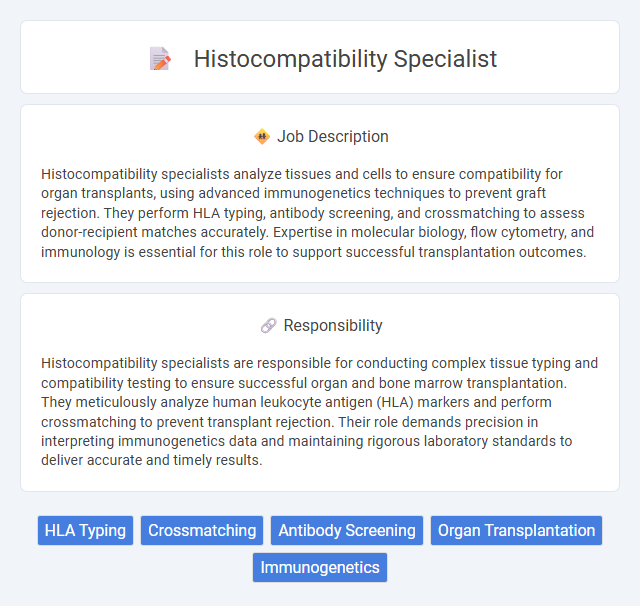
Histocompatibility specialists analyze tissues and cells to ensure compatibility for organ transplants, using advanced immunogenetics techniques to prevent graft rejection. They perform HLA typing, antibody screening, and crossmatching to assess donor-recipient matches accurately. Expertise in molecular biology, flow cytometry, and immunology is essential for this role to support successful transplantation outcomes.
Individuals with strong analytical skills and a keen attention to detail are likely suited for a histocompatibility specialist role, as the job involves complex tissue typing and genetic analysis. Candidates comfortable working in a precise, laboratory environment and capable of maintaining high accuracy under pressure probably thrive in this position. Those who prefer patient interaction may find the role less suitable, given its primarily technical and research-focused nature.
Qualification
A Histocompatibility specialist requires a strong background in immunology, molecular biology, or a related biomedical field, typically holding a bachelor's or master's degree. Certification through the American Society for Histocompatibility and Immunogenetics (ASHI) or equivalent credentials is highly preferred to validate expertise in tissue typing and transplantation immunology. Practical experience with laboratory techniques such as flow cytometry, PCR, and serological assays is essential for accurate compatibility testing and ensuring successful organ or tissue transplantation outcomes.
Responsibility
Histocompatibility specialists are responsible for conducting complex tissue typing and compatibility testing to ensure successful organ and bone marrow transplantation. They meticulously analyze human leukocyte antigen (HLA) markers and perform crossmatching to prevent transplant rejection. Their role demands precision in interpreting immunogenetics data and maintaining rigorous laboratory standards to deliver accurate and timely results.
Benefit
A Histocompatibility specialist is likely to benefit from working in a specialized field that combines immunology and genetics, offering opportunities to contribute to life-saving organ transplant procedures. Demand for these experts may result in competitive salaries and job stability within healthcare and research institutions. The role probably provides ongoing professional development and collaboration with multidisciplinary teams, enhancing both knowledge and career growth.
Challenge
A Histocompatibility specialist likely faces the challenge of accurately matching donor and recipient tissues to minimize transplant rejection, which requires deep understanding of immunogenetics and precise laboratory techniques. The complexity of interpreting HLA typing results and managing unexpected crossmatch outcomes may increase the difficulty of the role. Constant advancements in transplant technology and immunology probably demand continuous learning and adaptation to ensure successful patient outcomes.
Career Advancement
Histocompatibility specialists play a critical role in tissue and organ transplantation by matching donors and recipients to prevent rejection. Opportunities for career advancement include senior laboratory roles, supervisory positions, and specialized research in immunogenetics or transplantation biology. Certification through organizations like the American Society for Histocompatibility and Immunogenetics (ASHI) enhances professional credentials and opens pathways to leadership and academic opportunities.
Key Terms
HLA Typing
Histocompatibility specialists perform HLA typing to match organ and bone marrow donors with recipients, ensuring compatibility and reducing the risk of transplant rejection. They utilize advanced molecular techniques such as PCR and flow cytometry to accurately identify HLA alleles critical for transplantation success. Expertise in interpreting HLA typing results supports clinical decision-making and patient outcomes in transplant immunology.
Crossmatching
A Histocompatibility specialist expertly performs crossmatching procedures to ensure donor-recipient compatibility in organ transplantation, minimizing the risk of graft rejection. They analyze human leukocyte antigen (HLA) compatibility and conduct both serological and cellular crossmatches, including flow cytometry and complement-dependent cytotoxicity assays. Precision in interpreting crossmatch results is critical for successful transplant outcomes and patient safety.
Antibody Screening
Histocompatibility specialists play a critical role in antibody screening by identifying and analyzing antibodies that may cause transplant rejection. They utilize advanced techniques such as flow cytometry and Luminex assays to detect donor-specific antibodies, ensuring compatibility between organ donors and recipients. Accurate antibody screening helps reduce the risk of graft failure and improves transplant outcomes.
Organ Transplantation
A Histocompatibility specialist plays a critical role in organ transplantation by conducting complex tissue typing and crossmatching tests to ensure donor-recipient compatibility, reducing the risk of organ rejection. They analyze human leukocyte antigen (HLA) profiles using advanced molecular techniques, immunogenetics, and flow cytometry to provide accurate matching results vital for transplant success. Expertise in interpreting immunological assays and collaborating with transplant teams is essential to support optimal patient outcomes and long-term graft survival.
Immunogenetics
Histocompatibility specialists in immunogenetics analyze human leukocyte antigen (HLA) profiles to ensure compatibility for organ and stem cell transplantation. They employ molecular techniques such as PCR and sequencing to detect genetic variations critical for immune response matching. Expertise in immunogenetic testing supports successful transplant outcomes and minimizes graft rejection risks.
 kuljobs.com
kuljobs.com